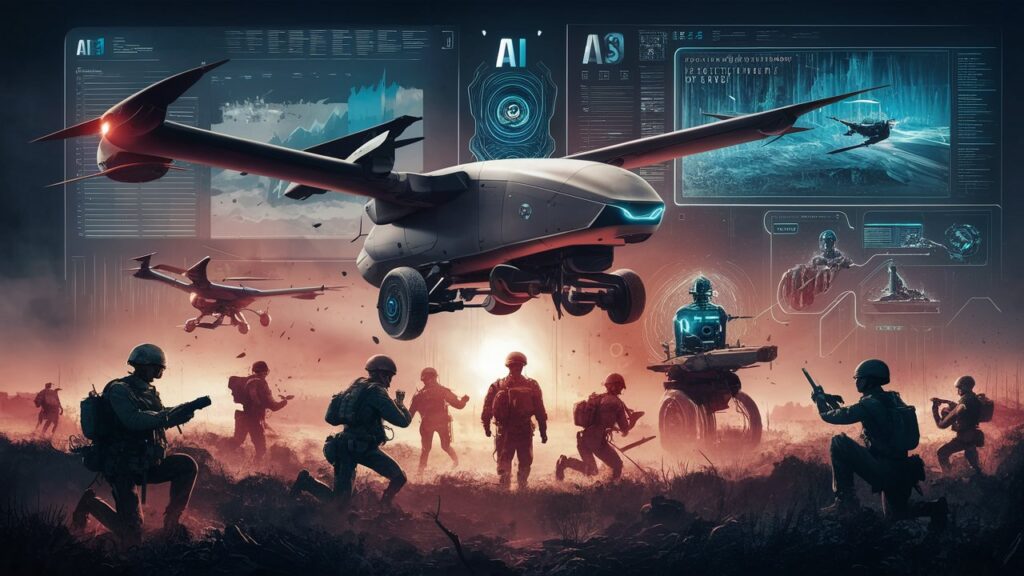Artificial Intelligence (AI) is no longer a futuristic concept confined to science fiction; it is reshaping the very nature of warfare. From the mundane tasks of logistics and maintenance to the critical decisions on the battlefield, AI is infiltrating every facet of military operations.
AI: A Force Multiplier on the Battlefield
AI-enabled tools and weapons are not mere figments of imagination; they are increasingly deployed in real-world conflicts, such as in Gaza and Ukraine. These tools offer unprecedented capabilities, from enhancing situational awareness to automating target identification and engagement.
AI-Driven Decision-Making: A Double-Edged Sword
The integration of AI into command and control systems, exemplified by projects like the Royal Navy’s StormCloud, allows for rapid data analysis and decision-making. However, the ethical implications of AI-driven decisions, especially in lethal operations, raise profound concerns about accountability and the potential for unintended consequences.
AI’s Expanding Role in Intelligence, Surveillance, and Reconnaissance
AI is revolutionizing intelligence gathering and analysis. Machine learning algorithms can sift through vast amounts of data from various sources, including satellite imagery, social media, and signals intelligence, to identify patterns and provide actionable insights. This not only enhances situational awareness but also enables faster and more accurate decision-making.
Ethical Concerns and Legal Challenges
The use of AI in warfare raises significant ethical and legal questions. Issues such as the potential for autonomous weapons to make life-or-death decisions without human intervention, the risk of algorithmic bias, and the difficulty of ensuring compliance with international humanitarian law are at the forefront of the debate.

The Future of AI in Warfare: A Paradigm Shift
The integration of AI into military systems is still in its nascent stages, but its potential impact is undeniable. As AI technology continues to advance, it is likely to play an increasingly pivotal role in shaping the future of warfare.
The Need for Responsible AI Development and Deployment
The development and deployment of AI in the military domain must be guided by ethical principles and international law. It is crucial to ensure that AI systems are transparent, accountable, and subject to meaningful human control.
The Geopolitical Implications of AI in Warfare
The race to develop and deploy AI-powered military capabilities has significant geopolitical implications. The balance of power could shift as nations with advanced AI capabilities gain a decisive advantage over their adversaries. This raises concerns about a potential arms race and the need for international cooperation to mitigate the risks associated with AI in warfare.
In conclusion, AI is poised to revolutionize warfare in ways that were once unimaginable. While the potential benefits are undeniable, the ethical and legal challenges are equally significant. As we navigate this new era of warfare, it is imperative to prioritize the responsible development and deployment of AI to ensure that it serves humanity’s best interests. <br> <br>
A Double-Edged Sword: AI’s Impact on Military Strategy
The integration of AI into military operations is not without its challenges. While AI can enhance efficiency and effectiveness, it also raises concerns about the potential for unintended consequences and the erosion of human control over critical decisions.
The Risks of Autonomous Weapon Systems
The development of autonomous weapon systems (AWS) that can select and engage targets without human intervention is a particularly contentious issue. Critics argue that AWS could lead to a loss of accountability and raise the risk of unintended escalation.
The Need for Human Oversight and Accountability
While AI can augment human decision-making, it is crucial to maintain meaningful human control over critical military operations. This includes ensuring that AI systems are transparent, explainable, and subject to rigorous oversight and accountability mechanisms.
The Challenge of Mitigating Algorithmic Bias
AI algorithms are not immune to bias, and the use of biased algorithms in military decision-making could have devastating consequences. It is essential to ensure that AI systems are trained on diverse and representative data sets and that their outputs are regularly audited for fairness and accuracy.
The ongoing debate about the role of AI in warfare is a testament to the transformative power of this technology. As AI continues to evolve, it is essential to engage in a thoughtful and nuanced discussion about its ethical, legal, and strategic implications. Only by doing so can we ensure that AI serves as a tool for peace and stability, rather than a catalyst for conflict and chaos.

Sunil Garnayak is an expert in Indian news with extensive knowledge of the nation’s political, social, and economic landscape and international relations. With years of experience in journalism, Sunil delivers in-depth analysis and accurate reporting that keeps readers informed about the latest developments in India. His commitment to factual accuracy and nuanced storytelling ensures that his articles provide valuable insights into the country’s most pressing issues.


